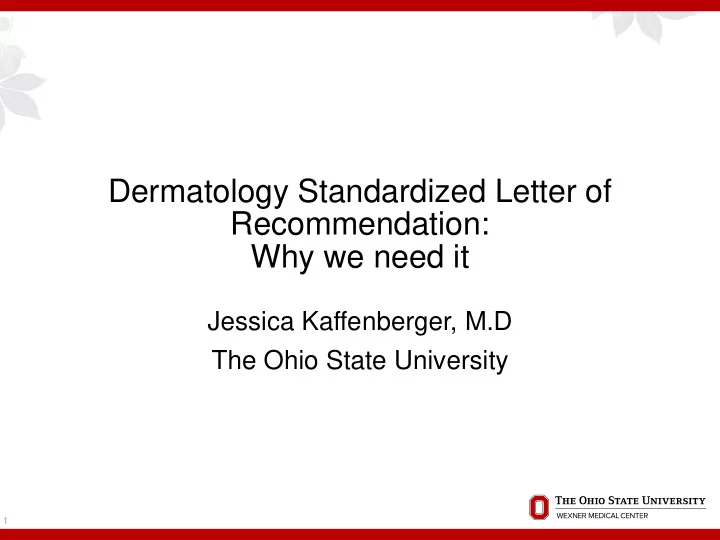

Dermatology Standardized Letter of Recommendation: Why we need it Jessica Kaffenberger, M.D The Ohio State University 1
Are letters of recommendation important? Proportion of Responders 0.3 ≈25% 0.25 ≈25% ≈25% 0.2 n =108 75% of 0.15 respondents rate 0.1 as 5, 6, or 7 0.05 0 1 2 3 4 5 6 7 Unimportant<------------------------> Very Important 2013 Survey of APD members, n= 108
2013 Survey of APD members, n=108 79% of APD respondents were in support or possibly in support of developing a SLOR 3
4
5
6
Kaffenberger et al. JAAD. 2014 Aug;71(2):395-6. 7
Contain a complicated hierarchy of laudatory phrases “…"outstanding" (or equivalent) was used in 37% and "excellent" (or equivalent) was used in 38%. Meaningful comparison to student colleagues appeared in 11%.” ( Fortune 2002). (Evaluated 966 NLOR for surgery positions) “If I can provide any additional information, please call…” was almost uniformly identified as a strong negative comment and was most commonly found in the…lowest ranked group of letters”. (Greenburg 1994) ( Evaluated 80 NLOR Surgery letters) Primary reason EM switched to SLOR. “Although a letter writer’s intent in using terms such as “excellent” may have been to imply a specific comparative value to a given characteristic, it was confusing to many program directors what that value really was and how frequently the writer used such terms when describing (Keim et al 1999) 8
Code words 19% of 763 NLORs evaluated for ENT residency contained “doubt raisers” (Messner 2008) “made an effort to be an effective team member” “average fund of knowledge” Low reliability between interpreting faculty members Low kappa (0.28) for NLOR evaluating 58 orthopedic residents (Dirschl 2000) 9
10
Emergency Medicine ENT Orthopedics Plastics 11
“You are on the right track to start using standardized letters….They are more helpful to separate applicants. We all use the standardized form.” - Sorabh Khandelwal M.D., Emergency Med Program Director at OSU “We have been using the standardized letter of recommendation for the past 3 years. I feel that we all like it. It is basically a scoring sheet that allows us to be a bit more objective when comparing applicants.” - Brad DeSilva, MD ENT Program Director at OSU 12
13
How reliable is a letter coming from each of the following groups? MOST reliable LEAST reliable (Kaffenberger et al 2014) 14
How reliable is a letter coming from each of the following groups? MOST reliable LEAST reliable (Kaffenberger et al 2014) 15
Information about writer’s background/writer-applicant relationship (unpublished data) NLOR 2.3 pieces of info SLOR 6 pieces of info 16
17
18 2013: APD surveyed on what they found 0.1 0.2 0.3 0.4 0.5 0.6 0.7 0.8 0.9 important in a LOR (n=108). Most impt: 0 1 Career Goals Work Ethic Reliability Personality Clinical Knowledge Comparison of applicant to general pool of applicants Dexterity Extracurricular Activities Grades Personality Punctuality Reason for choosing dermatology Reliability Research potential Completed Research Volunteer work Work Ethic
19
20
763 LORs evaluated for ENT residency Female letter writers more likely to comment on applicant being a team player, or compassionate. Males more likely to write a letter of “minimal assurance” (Messner et al 2008) 21
22
23
“I am writing to highly recommend” [ ] in application for a position in your residency program in Dermatology. “ [ ] demonstrated an ability to learn quickly and her turnaround on the paper was under RESEARCH three weeks, which impressed me….Our frequent meetings always demonstrated to me [ ]’s work ethic, determination, and ability to receive and respond to constructive criticism, incorporating them seamlessly into the finished research project …. developed a detailed knowledge base of our subject matter…” COMMUNICATION “[ ] discussed her assessment and plans with great articulation, enthusiasm and organization … ” “ [ ] always showed compassion, respect and concern for those with whom she came in GOOD contact…” INTERACTIONS 24
Research Communication Good interactions 25
“It is with great pleasure that I write this letter of recommendation…” “She is a hardworking , studious young woman who has proven herself WORK ETHIC to be able to meet challenges….” “ She was liked by members of our team and participated in clinic with GOOD INTERACTIONS curiosity and energy….She has attempted to find additional projects and is quite persistent in this; however, she also has the ability to study independently and she read a great deal while on our rotation ” 26
Work Ethic Good interactions 27
Less potential for applicant “glamorization” with SLOR Derm SLOR (unpublished data) Applicants’ positive traits were felt to be less exaggerated in SLOR vs NLOR (p<0.0001) 28
29
EM comparison of standardized and narrative LOR (Girzadas et al. 1998) SLOR interrater reliability 0.97 NLOR interrater reliability 0.78 Dermatology comparison of standarized and narrative LOR (unpublished data) W = Kendall Coefficient of concordance ρ -Spearman Rank Correlation Coefficient (averaged among 5 repeat interpreters) 30
31
2013 Dermatology APD survey, one of most impt criteria in a LOR 32
33
2013 Dermatology APD survey regarding NLOR, n= 108 Kaffenberger et al., 2014 34
35
EM (Girzadas et al. 1998) NLOR: 90 sec SLOR: 16 seconds Dermatology (unpublished data) NLOR: 2 min SLOR: 1 min 36
10. Current NLOR has numerous problems 9. Similar versions are already successful 8. Framework for where the letter is coming from 7. Incorporates qualities which are deemed important by APD 6. All applicants evaluated via same benchmarks 5. Potential for less exaggeration of traits 4. High validity 3. Ability to stratify applicants 2. Efficient/not redundant 1. SIMPLE! 37
cartoonbank.com 38
Recommend
More recommend